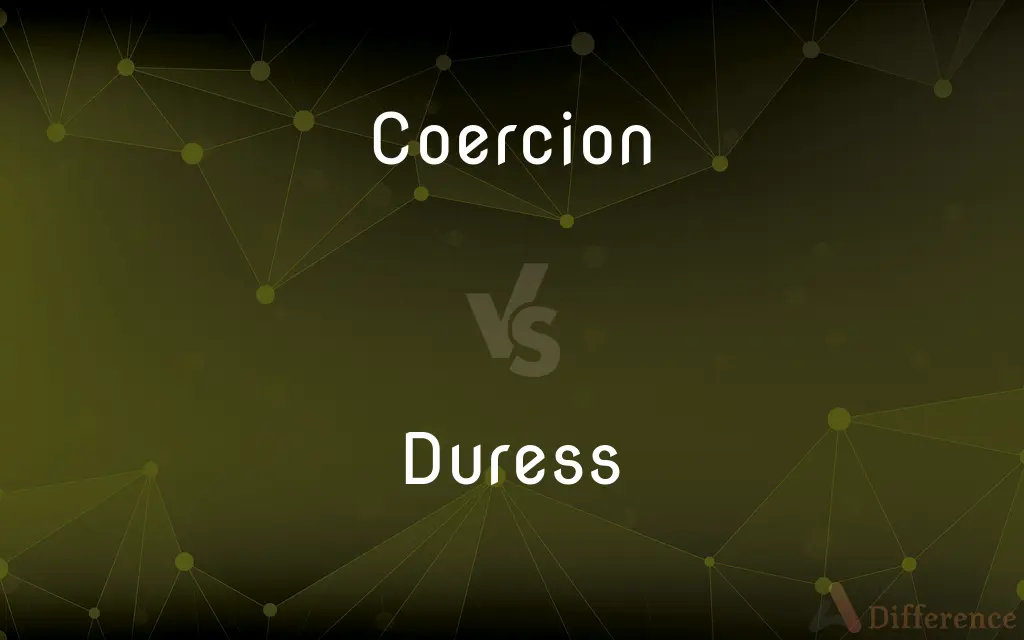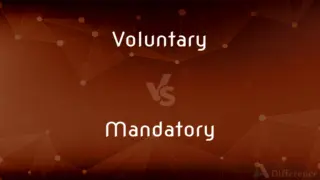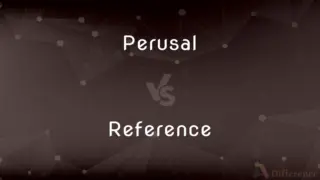Coercion vs. Duress — What's the Difference?
By Tayyaba Rehman & Urooj Arif — Updated on April 2, 2024
Coercion involves compelling someone to act through threats or pressure, whereas duress specifically refers to unlawful pressure making someone perform an act against their will.

Difference Between Coercion and Duress
Table of Contents
ADVERTISEMENT
Key Differences
Coercion is a broad term that encompasses various forms of pressure or influence to make someone do something they might not otherwise do, ranging from social pressure to threats of harm. Duress, on the other hand, is a more specific legal concept that involves compelling someone to act through the threat of violence, harm, or other penalties, and is often used to invalidate contracts or decisions made under such conditions.
While coercion can be applied in both legal and social contexts to describe any act of persuasion that goes beyond mere argument or advice, duress is typically reserved for situations where the pressure or threat used is unlawful or morally wrong. This distinction is crucial in legal contexts, where the presence of duress can affect the validity of contracts or the legality of actions.
In the context of coercion, the pressure exerted can take many forms, including psychological pressure, economic pressure, or the threat of social ostracization. Duress, however, almost always involves a clear, immediate threat to the personal safety or well-being of the individual or their loved ones, leading to a situation where refusal feels impossible.
Coercion may not always invalidate a legal agreement or decision, especially if the pressure used is seen as part of normal negotiation or social interaction. Duress, by its definition, renders any agreement made under such circumstances voidable, as it is predicated on the absence of free will.
Understanding the nuances between coercion and duress is critical for recognizing the legal and ethical boundaries of influence and consent. While coercion may encompass a wider range of behaviors, duress specifically targets the most extreme forms of pressure that threaten personal freedom and safety.
ADVERTISEMENT
Comparison Chart
Definition
Compelling someone to act through pressure or threats.
Compelling someone to act through unlawful threats or harm.
Scope
Broad, includes various forms of pressure.
Narrow, focused on unlawful or morally wrong threats.
Legal Consequences
Can be legal or illegal, depending on context.
Often renders agreements voidable or illegal.
Types of Pressure
Social, psychological, economic, etc.
Physical harm, immediate threats to personal safety.
Context of Use
Both legal and social contexts.
Primarily legal contexts, especially contracts.
Compare with Definitions
Coercion
Influence or pressure to ensure compliance or obedience.
Coercion can be subtle, like social pressure to conform.
Duress
A legal defense claiming actions were taken under immediate threat.
The accused argued that the confession was obtained under duress.
Coercion
Applying undue pressure in negotiations or decisions.
She felt coercion to sign the contract without fully understanding it.
Duress
Pressure that overcomes free will, typically involving threats of harm.
Duress can invalidate contracts if one party was forced to agree.
Coercion
A method of control through threats or force.
Coercion in the workplace can lead to a toxic environment.
Duress
Compulsion by threat or force to perform an act.
Signing the agreement under duress, he felt he had no other choice.
Coercion
The act of persuading someone to do something by using force or threats.
The mob's coercion involved threats to the businessman's family.
Duress
The use of unlawful threats to compel someone to act.
The contract was voidable because it was signed under duress.
Coercion
The use of power to compel action against someone's will.
The dictator's regime relied heavily on coercion to maintain control.
Duress
A situation where actions are performed out of fear of violence or retaliation.
Her decision was made under duress, fearing for her family's safety.
Coercion
Coercion () is compelling a party to act in an involuntary manner by use of threats, including propaganda or force. It involves a set of various types of forceful actions that violate the free will of an individual to induce a desired response, for example: a bully demanding lunch money from a student or the student gets beaten.
Duress
Compulsion by threat or violence; coercion
Confessed under duress.
Coercion
The act or practice of coercing.
Duress
Constraint or difficulty caused by misfortune
"children who needed only temporary care because their parents were ill, out of work, or under some other form of duress" (Stephan O'Connor).
Coercion
Power or ability to coerce.
Duress
A fraud achieved through the use of a threat or compulsion
She had a cause of action for duress. His claim was based on duress.
Coercion
(uncountable) Actual or threatened force for the purpose of compelling action by another person; the act of coercing.
Duress
A criminal defense for an act undertaken under threat of serious bodily harm
His defense was duress.
Coercion
Use of physical or moral force to compel a person to do something, or to abstain from doing something, thereby depriving that person of the exercise of free will.
Duress
Forcible confinement.
Coercion
(countable) A specific instance of coercing.
Duress
(obsolete) Harsh treatment.
Coercion
Conversion of a value of one data type to a value of another data type.
Duress
Constraint by threat.
Coercion
The process by which the meaning of a word or other linguistic element is reinterpreted to match the grammatical context.
Duress
(legal) Restraint in which a person is influenced, whether by lawful or unlawful forceful compulsion of their liberty by monition or implementation of physical enforcement; legally for the incurring of civil liability, of a citizen's arrest, or of subrogation, or illegally for the committing of an offense, of forcing a contract, or of using threats.
Coercion
The act or process of coercing.
Duress
To put under duress; to pressure.
Someone was duressing her.
The small nation was duressed into giving up territory.
Coercion
The application to another of either physical or moral force. When the force is physical, and cannot be resisted, then the act produced by it is a nullity, so far as concerns the party coerced. When the force is moral, then the act, though voidable, is imputable to the party doing it, unless he be so paralyzed by terror as to act convulsively. At the same time coercion is not negatived by the fact of submission under force. "Coactus volui" (I consented under compulsion) is the condition of mind which, when there is volition forced by coercion, annuls the result of such coercion.
Duress
Hardship; constraint; pressure; imprisonment; restraint of liberty.
The agreements . . . made with the landlords during the time of slavery, are only the effect of duress and force.
Coercion
The act of compelling by force of authority
Duress
The state of compulsion or necessity in which a person is influenced, whether by the unlawful restrain of his liberty or by actual or threatened physical violence, to incur a civil liability or to commit an offense.
Coercion
Using force to cause something;
Though pressed into rugby under compulsion I began to enjoy the game
They didn`t have to use coercion
Duress
To subject to duress.
Duress
Compulsory force or threat;
Confessed under duress
Common Curiosities
Is emotional pressure considered coercion or duress?
Emotional pressure is often categorized under coercion, especially if it doesn’t involve unlawful threats, but extreme cases could be considered duress.
How does coercion differ from duress in legal terms?
Coercion can involve a range of pressures and may not always be illegal, whereas duress specifically involves unlawful threats or harm, impacting legal validity.
Can both coercion and duress invalidate a contract?
Duress directly affects the legality of contracts, making them voidable. Coercion can also invalidate contracts, but it depends on the severity and nature of the pressure.
Are threats to property considered coercion or duress?
Threats to property can constitute coercion and, if severe and unlawful enough, may qualify as duress, depending on the jurisdiction and context.
Can financial pressure be considered duress?
Severe financial pressure, especially if resulting from unlawful threats, can be considered duress.
Can duress be used as a defense in criminal cases?
Yes, if it can be proven that the defendant acted under immediate threat of harm or violence, duress can be a valid legal defense.
How do courts determine if an action was taken under duress?
Courts consider the immediacy and severity of the threat, the absence of a reasonable alternative, and whether the threat was unlawful.
Does the law differentiate between physical and psychological duress?
Yes, the law recognizes both physical and psychological duress, though physical threats are often more straightforward to prove.
How do individuals prove they were under duress?
Proving duress involves demonstrating the presence of an immediate threat of harm, lack of reasonable alternative, and the influence of the threat on the decision made.
Is it possible to rescind a decision made under duress?
Yes, decisions or agreements made under duress are typically considered voidable, and the affected party can seek to rescind them.
Is peer pressure considered coercion?
Yes, peer pressure is a form of social coercion, influencing individuals to conform to group behaviors or decisions.
What role does consent play in determining coercion or duress?
Consent obtained through coercion or under duress is not considered free or valid, as it's not given willingly and with full understanding.
Can a verbal threat constitute duress?
Yes, a verbal threat can constitute duress if it's credible and creates a real fear of imminent harm.
Can the threat of legal action be considered coercion?
Threatening legal action can be considered coercion, especially if used to unfairly pressure someone into acting against their will.
Is coercion always intentional?
Coercion is generally understood to be intentional, as it involves deliberately applying pressure to influence someone’s actions.
Share Your Discovery

Previous Comparison
Voluntary vs. Mandatory
Next Comparison
Perusal vs. ReferenceAuthor Spotlight
Written by
Tayyaba RehmanTayyaba Rehman is a distinguished writer, currently serving as a primary contributor to askdifference.com. As a researcher in semantics and etymology, Tayyaba's passion for the complexity of languages and their distinctions has found a perfect home on the platform. Tayyaba delves into the intricacies of language, distinguishing between commonly confused words and phrases, thereby providing clarity for readers worldwide.
Co-written by
Urooj ArifUrooj is a skilled content writer at Ask Difference, known for her exceptional ability to simplify complex topics into engaging and informative content. With a passion for research and a flair for clear, concise writing, she consistently delivers articles that resonate with our diverse audience.
















































